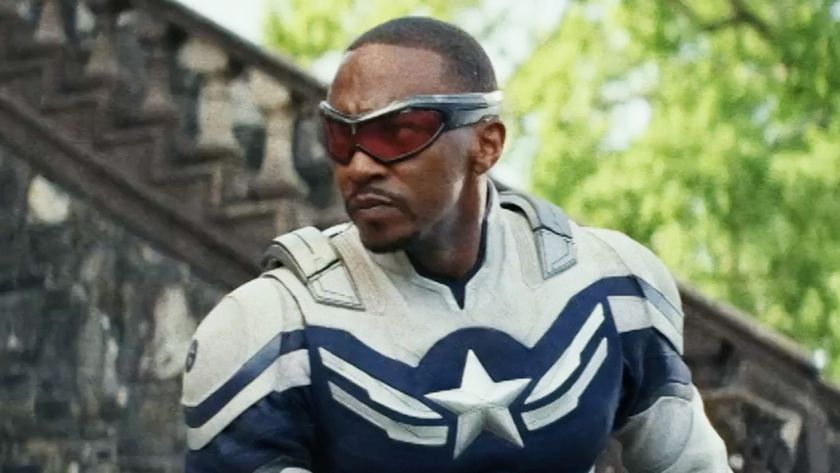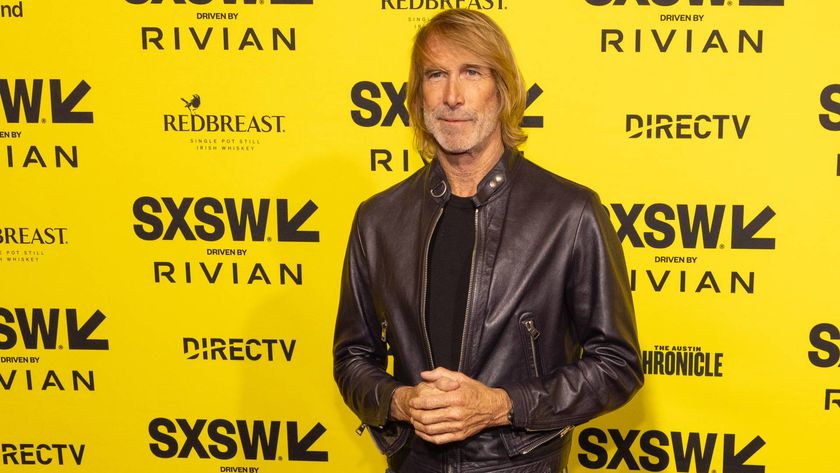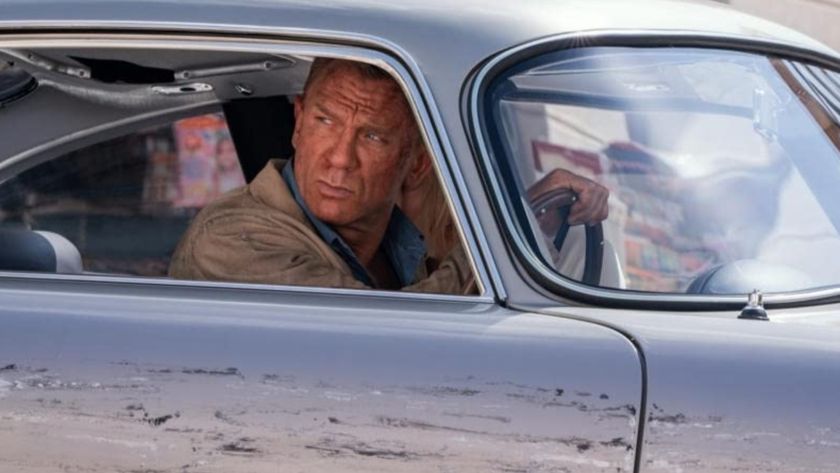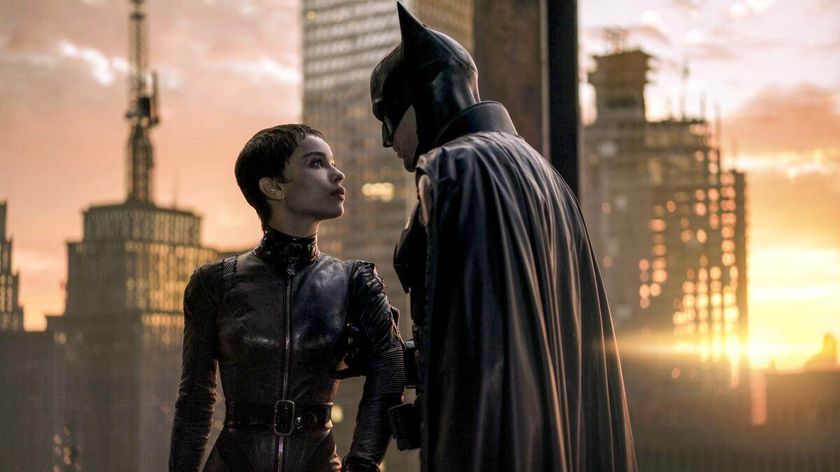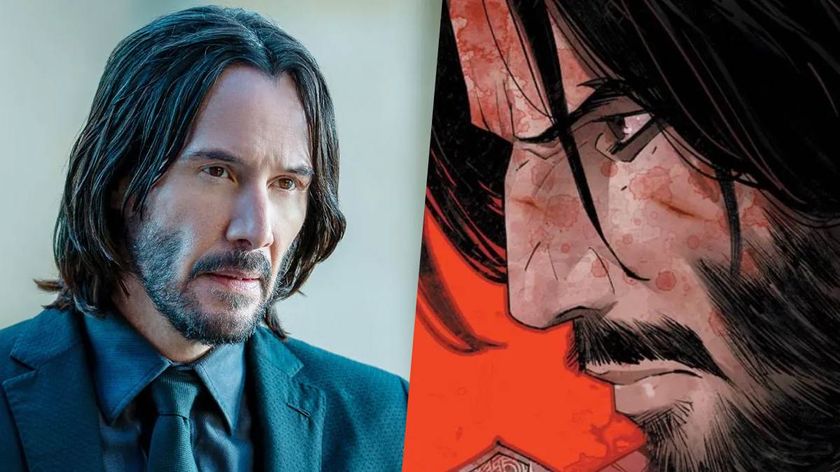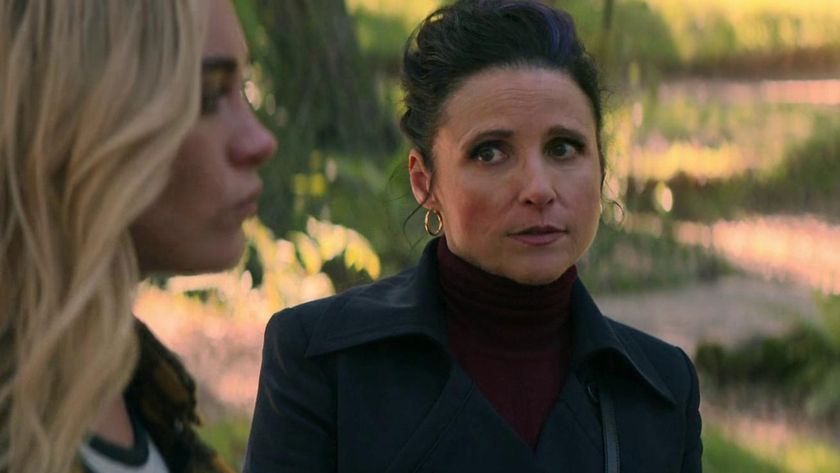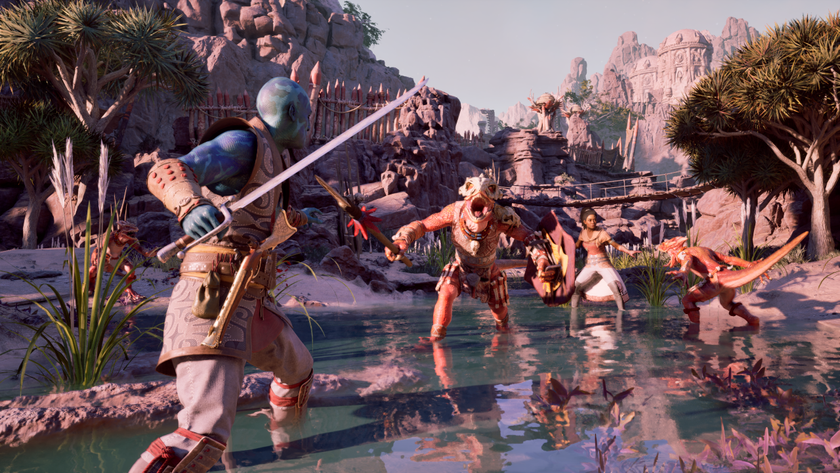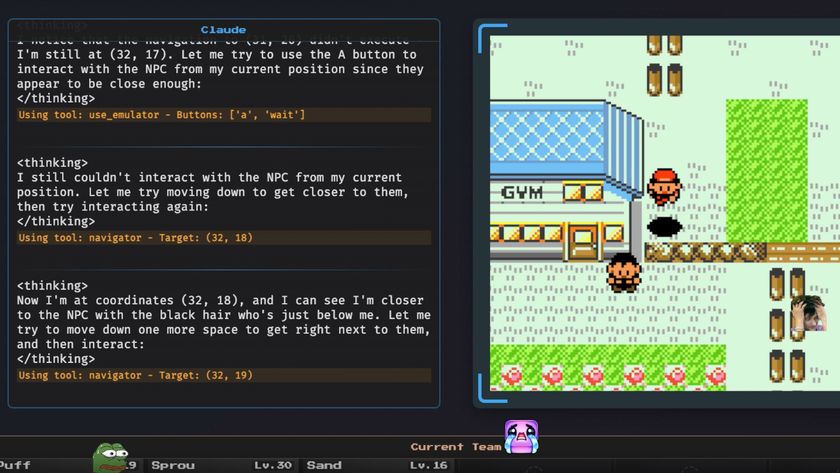McAvoy, Welsh & Baird on The Making Of Filth
James McAvoy, Irvine Welsh & Jon Baird reveal Filth-y secrets
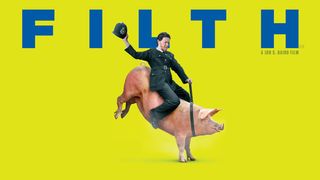
The Making Of Filth
We sat down with the terrifyingly talented trio behind 2013's raunchiest, funniest and blackest of comedies, Filth , to discuss the secrets behind the production.
Star James McAvoy, director and screenplay writer Jon Baird, and the novel's author Irvine Welsh chatted to us about the difficulties in getting the book onto the big screen, their favourite scenes, McAvoy going undercover in public screenings and much more...
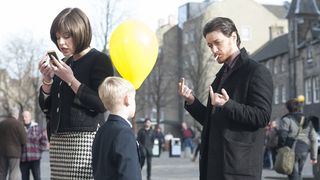
On the difficulty of adapting the novel to the big screen
Welsh: "I was surprised at how uncompromising Jon was [ in adapting the novel into a screenplay ]. It’s a very difficult character. When you’ve got a difficult character in a book that’s narrating the story, you can put the book down or you can fluff it up in your own mind because when you read a book you’re basically making a movie in your own head.
When you’re sitting in the cinema, you’re prisoner to a director’s vision, so you’ve got to find a way to make a film that’s more instantly approachable, you can’t do something that's going to sort of really turn people away."
McAvoy: "I thought this was one of the best scripts I've ever read. Certainly in the top three. It's an amazing script - so beautifully written. So entertaining, and vibrant, and dynamic and energetic, scary, harrowing, depressing, upsetting and repellant - and yet compelling.
Weirdly as much as it's about this monster, it's about humanity. So there's lots of things. And yet Jon managed to pull it off!"
Baird: "The toughest thing was to make Bruce [ James McAvoy ] followable because I think in the book he’s darker than the film. He’s less likable in the book than he is the film, so it was really how to make Bruce’s journey something you would care about regardless if you think he’s despicable or whatever.
And also the tapeworm, there was this tapeworm that runs through the middle of the book, but I put that to the side. That was the last thing I included and I managed to do it by personifying the tapeworm through Jim Broadbent’s character the psychiatrist. I concentrated far more on the mental and psychological decline of Bruce in the film, because in the book it’s more a physical decline.
In the film there's a flash of Dr Rossi turning into the tapeworm. In the first draft of the script, there would have been a lot more CGI when he was turning into the tapeworm. How we worked it out in the end, it was just like, subliminal flashes. You just have to get the right temperature in not being too effects-driven because sometimes that can take away the horror of it, you know? Especially in a film like this, it seems a bit too unreal.
It was also difficult finding a narrative because Irvine’s work is great for character and dialogue and it’s so rich that he spoils you with that - so it was a bit difficult to find a straight narrative.”
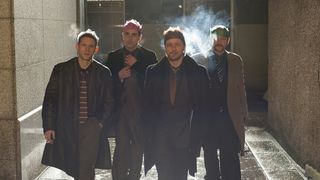
On the movie's biggest challenges
Baird: "The biggest challenge in this film was raising the finance, because five or six different people had looked at making the film before and it was seen as a dead project and it was always classed as 'the unfilmable novel'. There were huge challenges in that respect.
Conversely, having such a fantastic cast made it easier to direct because of the professionalism of the guys. With people like Jim Broadbent, the reason that he’s in every film that’s ever been made is that he’s not only a great actor, but he’s an absolute delight to work with. And directors will choose actors who are great to work with; not only who are great actors but who are great people.
I remember seeing this thing with Spielberg years ago where he said, 'If you cast your movie right, and you spend your time casting, then you’re 80% of the way there.'
And I’ve found that, even down to the one or two-line roles, I spent as much time getting them as I did with the supporting cast because one slip, when you’ve got so many who are performing to the top of their game, one little slip just takes you out the movie."
McAvoy: "The biggest challenge for me was the hangovers *laughs*. I don't usually get drunk when I'm making a film, but it was really appropriate to have a hangover every day on this, so I tried to have a hangover most mornings - but it wears you down. It makes you look like rubbish and it made me feel like rubbish, and all of that was quite helpful, actually. Without getting too method acting about it all, it was really helpful."
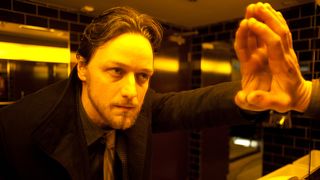
On its 'romantic' roots
Irvine Welsh: "The critics and the journalists seem to love it and the audiences seem to love it even more. It’s just that kind of thing - guys like it as it’s got that 'men at work' / 'guys getting f*cked up together' kind of thing. And women love it for some reason! I don’t know why, they seem to really be resonating with it and I don’t know why - I’m coming up with all kinds of theories.
I’m thinking it’s because they like the idea - it’s almost like a woman’s revenge fantasy - they like the idea of men not being able to get over them and being in freefall after that, you know?
Also, I think there’s this dark fairytale angle; it’s this quest for love, he’s looking for love. I think also, there’s obviously the McAvoy factor, he has such an empathetic persona, no matter how dark he plays it he just manages to connect with people as an actor in this way. He manages to emotionally connect and take you on this incredible roller coaster ride, so I think that’s why it’s doing so well."
Jon Baird: "I think Filth is a tragic love story really, that’s what I always regarded it as. There's dark comedy but the love story's quite tragic."
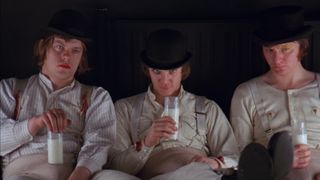
On movie inspirations
Baird: "Definitely A Clockwork Orange . Performance wise, I even took some reference from movies like American Psycho tonally.
Even something like Bad Santa for James’ character, that was kind of one of the references as well. Fight Club I suppose, in some ways."
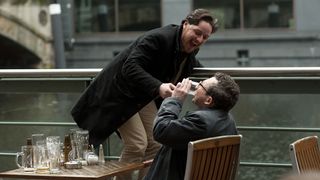
On the performances
Welsh: "The script calls for an actor to perform these sorts of transitions - it’s gymnastics almost in terms of acting skill and [ McAvoy ] does this in such an incredible way. The whole thing stands or falls on the performance of the lead actor, if you’ve got a guy like that who’s in every scene, the lead actor has to be able to perform - he’s not only done that but he’s massively exceeded our expectations.
When you’re talking about a sheer acting performance, with all the different emotional transitions, and to keep that character going and the empathy and connection with the audience, I just don’t see how it’s actually possible to act better that [ McAvoy's performance ]. There’s nothing more he could’ve done basically."
Baird: "The thing is, McAvoy is getting his plaudits because he raised the bar for the supporting cast, and they were the platform for him, right?
Because he’s bouncing of all these characters, if they’re no good, it’s just going to reflect on James as well so they’ve both helped each other.
I worked so hard because there have been other versions and other parties trying to adapt the novel and it never got made. I had to make sure that this script was the best it could ever be before it was sent out. The script was in such a good place at the point where we went into rehearsals, we weren’t at the point where we were working out what this is supposed to be. So rehearsal time was proper rehearsal time and that’s why I think the strength of the film really is the performances.”
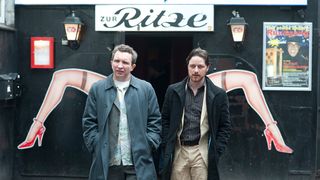
On awards buzz
Baird: "I think at the start I thought it might be [ too dark ], but it’s getting a great reaction. I think if anything from this film deserves something out of it, it’s James McAvoy. Hopefully James is recognised for what he’s done because I think he’s done something very special.”
Welsh : "McAvoy has to do all these different mood states and convincing transitions – he’s just having this massive dialogue with himself. It’s almost like a big stage performance, like a big Shakespearean stage performance done on camera, you know? So, he’s obviously going to have awards buzz and obviously I’m biased. I’d just give him everything for that because I don’t think it can be topped.
I think that if you’re involved in film or if you’re involved in art or culture, you shouldn’t be judging things by thematic concerns. You should be looking at the technical aspects of the acting and film making and judging on merit.
I know we’re living in bland kind of times - our culture is very bland and dull and we have these big events like X Factor, it’s just nonsense really. I would hope that people will recognise that boldness [ in Filth].
It’s tapping into something about who we are – it’s a very British kind of thing, It’s not trying to be Hollywood or anything else. It is talking about who we are and I think it’s important in our culture that we can still tell stories about ourselves, even if they are dark stories, even if they’re troubling stories… the things that we might not want to look at and see but we can still tell the story so it’s not all about this bland, happy smiles…”
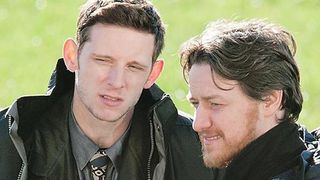
On the funniest memory during filming
Baird: "For me, the funniest memory from the shoot was probably some of the stuff from Jamie Bell because Jamie’s just such a natural comedian. I think when he did the scene with his face in the cocaine - the Scarface thing - he was just such a hoot during that. Jamie’s so self-deprecating and so funny and quick-witted and just normal. I think anything with Jamie always lightened the day.
Again, along with James, along with them all, I would work with them all again - and I hope they would do with me.”
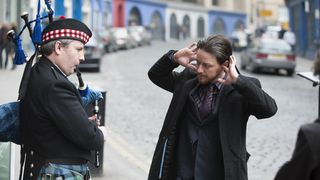
On their favourite scene
McAvoy: "My favourite scene is one in which I'm watching some old camcorder footage of my wife and child baking me a birthday cake. And I'm very upset because I'm estranged from them and I'm crying.
To make myself feel better, I pick up the phone and call my best mate's weird wife, and then I pretend to be a 1990s comic and chatshow host called Frank Sidebottom - who was from Manchester - and he had a bit of a funny voice (that I can't really do *laughs*). I'm phoning her and I'm crying watching my life, and I'm basically having phone sex whilst pretending to be Frank Sidebottom whilst masturbating and watching what's going on on the telly - and for me, that scene is very Irvine Welsh.
We managed to get a bit of Irvine on camera there, because it's funny but it's also really surprising and shocking and repugnant.
But yet compelling because it's full of humanity - that's probably my favourite scene in the whole film."
Baird: "I love the scene where Bruce (McAvoy) and Amanda (Imogen Poots) are on the stairs and they’re having this incredible argument. It finishes really emotionally and it gets really dark and mad. That’s a fantastic scene because it goes to so many different places - I could tell that when it was shot the crew had an absolutely amazing response to that so I knew that this hard pro crew were really being affected.
The stuff with Jim Broadbent, the Dr Rossi stuff I love because I’m a huge Kubrick fan and those scenes were a huge nod to A Clockwork Orange . I kind of like it all, for different reasons.”
[SPOILER ALERT]
Welsh: "I’ve got a fondness for them all. One of the ones that makes me really laugh is where Bruce is being kidnapped by the thugs at the end. He’s in drag and he’s got the beard and says "my husband is Detective Sergeant Robertson."
That’s a tea spitter for me that one. But you can’t take your eyes of him, James, he’s just electric."
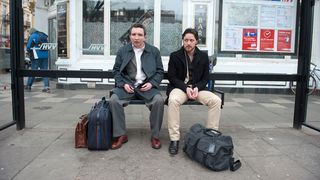
On watching Filth with an audience for the first time
Baird: "The first time I watched it with an audience it was so nerve-racking because it was a test screening and lines get said that really pushed us. They knew what they had, they didn’t know if people were going to like it.
So they tested it in Milton Keynes and I didn’t know where Milton Keynes was, I’d never been there before. It was almost like that Sinatra song – if you can make it here, you can make it anywhere!
The funny thing was we had James McAvoy in disguise in the test screening - he had a flat cap on and thick glasses and a collar up and he watched it with me and we were both sinking into our seats at the end, so that was a great moment."
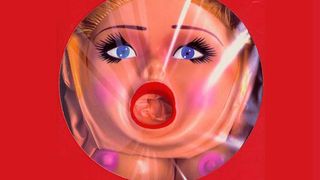
On Trainspotting sequel, Porno
Welsh : "We're just trying to get the script together, and everything is down to script. There’s no point in doing something like that if it’s just a sort of old boy’s reunion, other people have got to be interested as well.
Everybody is keen to do it but they’re only keen to do it as a really great script. The challenge is to get a script with the quality of Trainspotting which is not that easy to do. I’m of the belief that a sequel has to be almost better than the original and that’s a tough challenge to get a sequel to Trainspotting that’s as good as Trainspotting , so that’s the challenge we’re facing now.
Hopefully we’re equal to the task but we probably have to really do this now or over the next couple of years or it’s never going to be done.
2016 is the 20th anniversary of Trainspotting , so it'd be nice to get it out then. That gives us next year to do the script and to really hammer a script into shape in 2014, and then shoot in 2015 and have it out in 2016. It is kind of doable but it just depends on how this is going to work out. It’s a big, big challenge.”
Baird: "[I wouldn't want to get involved]. No, that’s John Hodge and Danny Boyle's characters - that’s their thing. And I didn’t feel any pressure making Filth because Filth is mine and Irvine’s. But I would feel pressure making a sequel to Trainspotting or a remake and I think Danny is the man to make that.”
